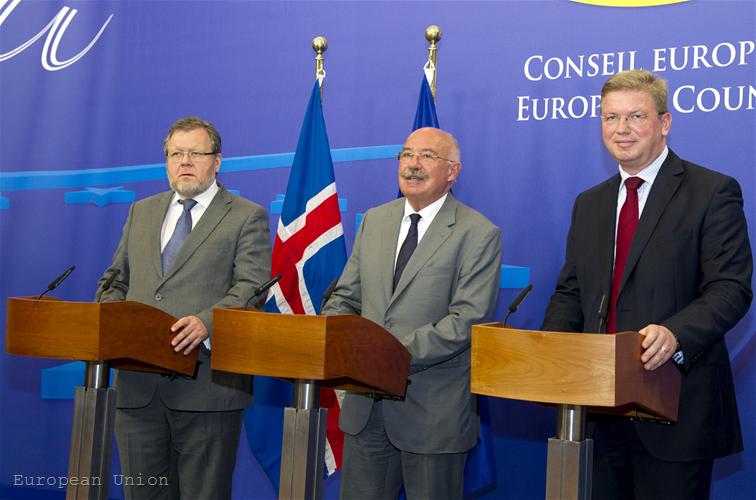MEPs: EU leaders have failed the stress-test
Ralitsa Kovacheva, June 23, 2010
 Some of the major groups in the European Parliament gave contradictory assessments on the results of the European Council on June 17. The evaluation of the largest group, the European People's Party, is entirely positive. Which is understandable, given that the European Council (and also the European Commission and European Parliament), is headed by a representative of theirs - the prominent President of the Council Herman van Rompuy.
Some of the major groups in the European Parliament gave contradictory assessments on the results of the European Council on June 17. The evaluation of the largest group, the European People's Party, is entirely positive. Which is understandable, given that the European Council (and also the European Commission and European Parliament), is headed by a representative of theirs - the prominent President of the Council Herman van Rompuy.
"The decision of European leaders to combine fiscal discipline with prospects for  economic growth is the right policy option”, the chairman of the EPP Joseph Daul commented. Joseph Daul also expressed satisfaction that the European Council had approved tightening of fiscal surveillance policy, and new progressive sanctions announced for "bad boys" and incentives for "good students".
economic growth is the right policy option”, the chairman of the EPP Joseph Daul commented. Joseph Daul also expressed satisfaction that the European Council had approved tightening of fiscal surveillance policy, and new progressive sanctions announced for "bad boys" and incentives for "good students".
 According to the Green MEPs Rebecca Harms and Daniel Cohn-Bendit, Co-Presidents of the Greens/EFA group in the European Parliament, however, while EU heads of state had debates about stress-tests for banks, they failed their own stress-test. “In spite of Merkel and Sarkozy's Berlin statements, a strategy for a Common European Economic Policy is yet to be found. EU heads of state still don't dare to commit to real economic governance and refuse to give more power to Brussels.”
According to the Green MEPs Rebecca Harms and Daniel Cohn-Bendit, Co-Presidents of the Greens/EFA group in the European Parliament, however, while EU heads of state had debates about stress-tests for banks, they failed their own stress-test. “In spite of Merkel and Sarkozy's Berlin statements, a strategy for a Common European Economic Policy is yet to be found. EU heads of state still don't dare to commit to real economic governance and refuse to give more power to Brussels.”
They stated that “the EU 2020 Strategy that was adopted today, and which had been strongly criticised by the European Parliament only yesterday, is no ambitious step out of the crisis. The Lisbon Strategy failed because of its lack of compulsory goals, EU 2020 is likely to share the same fate.” Thy also criticized the lack of progress on climate policy and the outdated goals (three years old) to reduce greenhouse gas emissions, set in the strategy.
Both leaders of the Greens/EFA are particularly critical with regard to the  financial transaction tax, the approval of which by the Council “has been sunk by the British veto”. “EU leaders tried to save the situation with a bluff by asking the G20 to explore and develop a financial transaction tax - but in plain language this amounts to nothing more than its death.” The Greens demand that the Euro-Group introduce such a tax in the eurozone, in order to give a strong signal to the upcoming G20 summit. ”A bank levy, as supported by the Council Summit today, is a welcome addition, but in no way a replacement for a financial transaction tax, which would not only fight speculation, but also provide states with an additional source of badly needed income.”
financial transaction tax, the approval of which by the Council “has been sunk by the British veto”. “EU leaders tried to save the situation with a bluff by asking the G20 to explore and develop a financial transaction tax - but in plain language this amounts to nothing more than its death.” The Greens demand that the Euro-Group introduce such a tax in the eurozone, in order to give a strong signal to the upcoming G20 summit. ”A bank levy, as supported by the Council Summit today, is a welcome addition, but in no way a replacement for a financial transaction tax, which would not only fight speculation, but also provide states with an additional source of badly needed income.”
Strongly in favour of the financial transaction tax is also the Group of the Socialists and Democrats. According to it, “a tax rate of just 0.05 per cent would produce revenues of up to €250 billion in Europe, helping to avoid painful spending cuts and creating millions of jobs if invested in the economy”. A proposal for such a tax had already been endorsed by the European Parliament in March, the S&D Group reminded.
 The most acute, however, was the reaction of the Group of the Liberals and Democrats (ALDE). Its leader Guy Verhofstadt defined the Council as "a missed opportunity to produce an ambitious and far-reaching reform of Europe's economic governance and competitiveness strategy as EU leaders contented themselves with half measures that fail to live up to the challenges presented by the current crisis."
The most acute, however, was the reaction of the Group of the Liberals and Democrats (ALDE). Its leader Guy Verhofstadt defined the Council as "a missed opportunity to produce an ambitious and far-reaching reform of Europe's economic governance and competitiveness strategy as EU leaders contented themselves with half measures that fail to live up to the challenges presented by the current crisis."
Verhofstadt blamed the Council that it “has not understood the message of the Parliament, united behind a resolution on economic governance and one on Europe 2020. The European Parliament stressed the necessity for more Community method instead of intergovernmentalism and for more enforceable measures instead of the open coordination and peer review, which has been proven in the Lisbon Strategy not to work.”
According to his colleague, Lena Ek (Sweden, Centre Party), peer review and occasional monitoring will not be enough to effect the necessary policy changes in Member States if there are no genuine sanctions for non-compliance. She criticized member states for their “ lack of vision and political will to think and act collectively”.
Guy Verhofstadt defined the Europe 2020 strategy as “weak” and warned: “If the Council remains deaf to the Parliament, we might refuse to cooperate on some of their demands."
Such strong criticism points to the new self-confidence of MEPs since the institution  acquired new powers under the Lisbon Treaty. A desire for more active involvement of Parliament in the decision making process in the EU made the President of the institution Jerzy Buzek, who took part briefly in the Council. So far, however, EU leaders continue to ignore the parliament on important decisions which speaks of forthcoming storms. The example of the European diplomatic service is sufficient to show how difficult and slow things can become if MEPs, after the words of Verhofstadt, refuse to cooperate. And this is not helpful to anyone.
acquired new powers under the Lisbon Treaty. A desire for more active involvement of Parliament in the decision making process in the EU made the President of the institution Jerzy Buzek, who took part briefly in the Council. So far, however, EU leaders continue to ignore the parliament on important decisions which speaks of forthcoming storms. The example of the European diplomatic service is sufficient to show how difficult and slow things can become if MEPs, after the words of Verhofstadt, refuse to cooperate. And this is not helpful to anyone.
 | © European Union
| © European Union | © Larus Karl Ingason
| © Larus Karl Ingason | © euinside
| © euinside